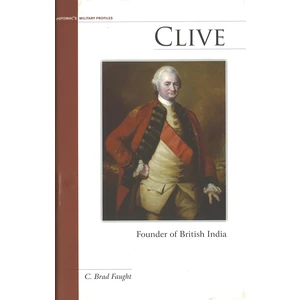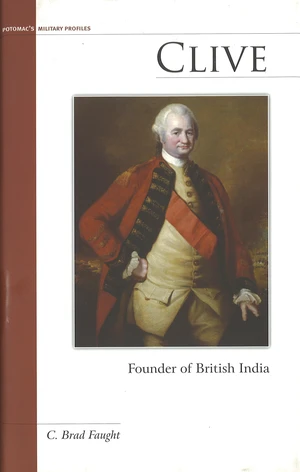Robert Clive (1725–1774), later 1st Baron Clive, is widely considered the founder of British India. He arrived in Madras as a clerk for the East India Company in 1744. Through timely promotion and a clear affinity for military leadership, he proceeded to consolidate the company’s commercial and territorial position in South India before doing the same in the northeast in Bengal. In 1757 company troops under his command defeated the nawab of Bengal at the Battle of Plassey. This victory set in motion the East India Company’s ascendancy over much of India, paving the way for the 1857 creation of the British Raj, which would last for another ninety years. Clive is a fascinating and important historical figure: a lowly company employee who rose to great heights; an informally trained military
commander who led company and local Indian troops to a series of stirring victories over local rivals who were supported by the French; a grasping politician who used his great wealth to secure a prominent social position; and, finally, a hounded society notable who, plagued by illness, allegedly took his own life. No one in the early days of the British ventures in India was as well known or as controversial as Clive became. In our own day, when empire and globalism are witnessed and talked about with ease, Clive’s position as both a servant of the East India Company—which developed into the world’s largest transnational trading company at the time—and an agent of imperialism makes him a surprisingly resonant figure.
more
Cheapest product
€21.36 | Ebooks.com USD | In stock
Do you have a better product in your shop?
Cheapest product
€21.36 | Ebooks.com USD | In stock
Do you have a better product in your shop?
Available in
What shops say
Ebooks.com USD
Robert Clive (1725–1774), later 1st Baron Clive, is widely considered the founder of British India. He arrived in Madras as a clerk for the East India Company in 1744. Through timely promotion and a clear affinity for military leadership, he proceeded to consolidate the company’s commercial and territorial position in South India before doing the same in the northeast in Bengal. In 1757 company troops under his command defeated the nawab of Bengal at the Battle of Plassey. This victory set in motion the East India Company’s ascendancy over much of India, paving the way for the 1857 creation of the British Raj, which would last for another ninety years. Clive is a fascinating and important historical figure: a lowly company employee who rose to great heights; an informally trained military commander who led company and local Indian troops to a series of stirring victories over local rivals who were supported by the French; a grasping politician who used his great wealth to secure a prominent social position; and, finally, a hounded society notable who, plagued by illness, allegedly took his own life. No one in the early days of the British ventures in India was as well known or as controversial as Clive became. In our own day, when empire and globalism are witnessed and talked about with ease, Clive’s position as both a servant of the East India Company—which developed into the world’s largest transnational trading company at the time—and an agent of imperialism makes him a surprisingly resonant figure.

